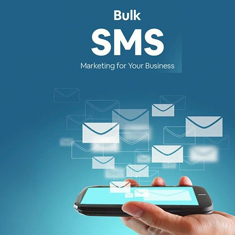|
Basically the use of email to promote products and/or services. But a better email marketing definition is the use of email to develop relationships with potential customers and/or clients. Email marketing is one segment of internet marketing, which encompasses online marketing via websites, social media, blogs, etc. It is essentially the same as direct mail except that instead of sending mail through the postal service, messages are sent electronically via email.
At its best, email marketing allows businesses to keep their customers informed and tailor their marketing messages to their customers.
Email Marketing Can Be Personalized
Particular groups of customers can be targeted or even individuals. Offering individual customers special deals on merchandise and/or services on the customer's birthday, for instance, is one example of email marketing personalization. (A restaurant might send an email to customers on their birthday offering 50% off an entree,) Email marketing helps a business develop and maintain a relationship with a customer over time that hopefully results in increased sales and increased customer loyalty.
Email marketing best practices include developing your own email list rather than buying an email list(s) and making participation in your email list opt-in rather than opt-out (using permission-based email marketing). Email should also be optimized for mobile usage as according to statistics over half of emails are opened on mobile devices.
The Advantages of Email Marketing
The two big advantages of email marketing are price and ease. Emailing is an inexpensive way to advertise your company and its products and/or services compared to many other types of marketing. It's also extremely easy to set up and track an email marketing campaign, making it a very accessible type of marketing for small businesses.
Newsletters can be sent to the email list you've built from the people who provided the necessary information on your website, for instance, providing these potential customers with news updates about your company, upcoming events and/or special offers – and, of course, reminding them that your business exists and that maybe it's time for another visit.
Email Marketing Is Still Relevant
In an age of increasing usage of social media for advertising, email marketing still rules the roost, according to a study conducted by HostPapa:
• 94% of Internet users use email, while only 61% use social media
• 75% of adult online users say that email marketing is their preferred marketing method
• the "opt-in" feature of email allows marketing by consent
• email marketing allows targeting by demographics (age, income, etc.)
• email messages have a much wider range of formatting possibilities than social media messages
• email offers more reporting and analytics capability, such as click-through rates, open rates, bounce rates, and conversions
The huge advantage of email over social media is that prospects and customers are more likely to see an email than social media. Just posting something doesn't mean that everyone you want to see your message will see it. Your post might not even show up in your targets' social media streams. However, an email will sit in the inbox until it's read (or deleted).
Ideally, email marketing should go hand-in-hand with social media. Adding social media "Like" or "Share" buttons to your marketing emails gives an additional way for customers to connect with your brand. Snippets of positive reviews from social media fans can be included in emails, and conversely, social media postings can be used to encourage fans to subscribe to your email newsletters.
Email marketing can substantially increase your income if you do it correctly. (See the tips below.) It's a great way to get people to visit and/or revisit your website or blog, and more traffic usually equates to more income.
Email Marketing Tips
1. Build your own list. This has already been mentioned but buying email lists is a waste of time. All you're going to do by sending unsolicited email is turn off most of the people you're hoping to turn into customers and run the risk of being labeled a spammer.
2. Adhere to the rules of the CAM-SPAM Act. These rules include having a non-deceptive subject line, a method of unsubscribing, and your name and address at the end of the emails.
3. Don't just send out ads to buy all the time. Use your emails to build rapport with customers by sharing your expertise and/or that of others, giving them tips and insights they can value. Share information that lets them know more about you and/or your company if it's interesting.
1. Treat your list well. Remember that the people you're using email to communicate with have trusted you with their email and name; they deserve your respect. Just as you deserve as a chance to convert them from customers to fans and even evangelists for your brand, people who want to talk about and share your message and get involved in any way they can.
2. Stick to a schedule if you're doing a newsletter. Sending email on a regular day or days can help your subscribers know what to expect from you and when.
Why Email Marketing is important ?
It can be used thoughtfully to build loyalty and trust in your brand. Email marketing is important for building relationships with prospects, leads, current customers, and even past customers because it gives you a chance to speak directly to them, in their inbox, at a time that is convenient for them
1. More effective for customer acquisition
2. Economic and Cost Effective
3. Personal and Customisable
4. Action Oriented
5. Measurable
6. Mobile devices allow people to check their email constantly
|
 |